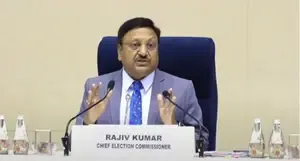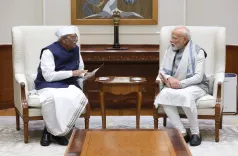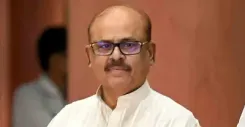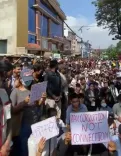Election Commission of India Bids Adieu to Rajiv Kumar, 25th CEC

Synopsis
Key Takeaways
- Rajiv Kumar served as the 25th Chief Election Commissioner of India.
- He oversaw elections across 31 States and UTs.
- Implemented significant reforms enhancing voter registration processes.
- Promoted technology to combat misinformation in elections.
- Encouraged inclusive electoral participation among marginalized groups.
New Delhi, Feb 18 (NationPress) The Election Commission of India on Monday said goodbye to Rajiv Kumar, who will be stepping down from his role as Chief Election Commissioner on Tuesday (February 18).
Rajiv Kumar became an Election Commissioner on September 1, 2020, and took charge as the 25th Chief Election Commissioner of India on May 15, 2022. His tenure, lasting a remarkable 4.5 years, was marked by significant yet understated reforms across various sectors, including structural, technological, capacity development, communication, international cooperation, and administration.
During his time, Kumar successfully oversaw one complete electoral cycle, managing elections across 31 States and Union Territories, as well as the Presidential and Vice-Presidential elections in 2022, the Lok Sabha elections in 2024, and the Rajya Sabha renewals. This achievement stands as a significant milestone in the realm of electoral management, with elections conducted peacefully, demonstrating near-zero instances of repolls and violence.
In his farewell speech, CEC Rajiv Kumar expressed gratitude towards the 15 million polling officials for their unwavering commitment to upholding democratic principles. He emphasized that the confidence of nearly a billion voters remains unshaken despite politically motivated and unverified attacks on India's democratic framework. As a strong advocate for technology, Kumar proposed strategies to enhance electoral conduct while addressing the risks of cyber threats and misinformation on social media. He praised voters for their active participation, especially women, noting that the electoral process is progressing towards greater inclusivity.
Election Commissioners Gyanesh Kumar and Dr Sukhbir Singh Sandhu expressed their admiration for the inclusive and transformative leadership exhibited by CEC Rajiv Kumar, which has fortified electoral processes and elevated India's international standing in election management.
Under CEC Kumar, the tenure was characterized by numerous electoral reforms, such as implementing four qualifying dates for voter registration with an advanced application system for young individuals aged 17 and above; simplified voter registration forms; redefining electoral boundaries through delimitation in Assam; and facilitating voting for polling personnel at Voter Facilitation Centres to prevent intimidation, delays, and misconduct. These initiatives aimed to empower every eligible citizen while modernizing election administration.
Kumar was a strong proponent of technology-driven electoral reforms to improve efficiency, transparency, and accessibility. His leadership fostered the development of ERONET 2.0, which manages the largest electoral databases, enhancing voter roll management with multi-layered security and real-time application processing. Kumar also instituted measures to combat misinformation and fake news on social media, launching a myth vs reality register during the Lok Sabha Elections 2024.
His contributions were both systemic and deeply human. His hands-on leadership was evident in his actions. On the global front, Kumar amplified India's voice in promoting democratic values, with the Election Commission leading the 'Cohort on Election Integrity' initiative and training officials from numerous election management bodies.
Beyond institutional reforms and global leadership, his tenure was marked by deeply personal and compassionate gestures that embodied the essence of democracy. He believed every voter, irrespective of age or ability, deserved recognition and respect. Efforts were made to enroll marginalized groups such as PVTGs and third genders.
In a show of respect, he personally wrote letters to over 250,000 centenarian voters, acknowledging their contributions to democracy. He urged youth and urban voters to draw inspiration and engage actively in the electoral process. He consistently advocated for innovative measures, such as establishing polling stations in high-rise societies to combat the growing trend of youth and urban disenchantment with the electoral process.
A passionate trekker, he undertook a challenging journey to one of India's most isolated polling stations to understand the obstacles faced by polling personnel, inspiring innovations like specially designed EVM carry bags for easier transport in rugged terrains, route rationalization, and the near elimination of P-3 polling stations. Known for his poetic flair, CEC Kumar utilized shayari to simplify complex electoral topics, engaging the public and reinforcing trust in the democratic process. An aficionado of Indian classical and devotional music, Kumar also practices meditation.






